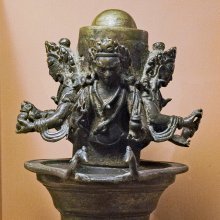Yogi, Yogī: 18 definitions
Introduction:
Yogi means something in Buddhism, Pali, Hinduism, Sanskrit, Marathi, Hindi. If you want to know the exact meaning, history, etymology or English translation of this term then check out the descriptions on this page. Add your comment or reference to a book if you want to contribute to this summary article.
Images (photo gallery)
(+3 more images available)
In Hinduism
Vaishnavism (Vaishava dharma)
Source: humindian: 108 names of Lord KrishnaOne of the 108 names of Krishna; Meaning: "The Supreme Master"
Source: ISKCON Press: GlossaryYogī (योगी).—A transcendentalist who practices one of the many authorized forms of yoga, or processes of spiritual purification; those who practice the eight-fold mystic yoga process to gain mystic siddhis or Paramātmā realization.
Source: Pure Bhakti: Bhagavad-gita (4th edition)Yogī (योगी) refers to “(1) One whose heart remains connected with Śrī Bhagavān (2) One who endeavours for spiritual perfection”. (cf. Glossary page from Śrīmad-Bhagavad-Gītā).
Source: Pure Bhakti: Bhajana-rahasya - 2nd EditionYogī (योगी) refers to:—One who practises the yoga system with the goal of realisation of the Supersoul or of merging into the Lord’s personal body. (cf. Glossary page from Bhajana-Rahasya).

Vaishnava (वैष्णव, vaiṣṇava) or vaishnavism (vaiṣṇavism) represents a tradition of Hinduism worshipping Vishnu as the supreme Lord. Similar to the Shaktism and Shaivism traditions, Vaishnavism also developed as an individual movement, famous for its exposition of the dashavatara (‘ten avatars of Vishnu’).
Shaivism (Shaiva philosophy)
Source: Manblunder: Sri Rudram 4.7-17Yogis are capable of taking any type of bodies due to their yogic power. A Yogi, the one who has conquered his senses establishes a link between the subject and the object during his experience, thereby knowing both the object and the subject simultaneously. An enlightened yogi continues to know the experiencer in the three lower levels of consciousness. For him, the link between the object and the subject is established by circumventing the mind, as the mind causes impressions. A yogi does not get satisfied with the intriguing bliss hence, he progresses further and further to know the One who causes this bliss. Bliss is nothing but the entry point into Rudra’s expanded cosmic energy.

Shaiva (शैव, śaiva) or Shaivism (śaivism) represents a tradition of Hinduism worshiping Shiva as the supreme being. Closely related to Shaktism, Shaiva literature includes a range of scriptures, including Tantras, while the root of this tradition may be traced back to the ancient Vedas.
Purana and Itihasa (epic history)
Source: archive.org: Shiva Purana - English TranslationYogī (योगी) or Yogin represents an epithet of Śiva, according to the Śivapurāṇa 2.2.10. Accordingly as Viṣṇu said to Brahmā:—“[...] He rests and relaxes in His own soul. He is free from the pair of opposites, such as happiness and unhappiness. He is subservient to His devotees in a fine physical body. He is a Yogin [Yogī] devoted always to the practice of Yogas. He is guide to the path of Yoga”.
Source: Cologne Digital Sanskrit Dictionaries: The Purana IndexYogi (योगि).—(Siddha) he who has practised brahmacarya, ahiṃsa, satya, non-stealing, and a parigraha and cultivated a sense of detachment;1 is superior to all for he performs tapas for a hundred years standing on one foot and living on air;2 dharmaśāsanam of: ahiṃsaka; walking on good roads, drinking clean and filtered water and speaking truthful words; after serving his guru for a year goes about begging alms;3 gets the dhāraṇa and tries to avoid the upasargas; must understand the seven sūkṣmas; mahisūkṣma, āpa, tejas, vāyu, vyoma, manas and buddhi sūkṣma, and the condition of these before these elements attain the sthūlabhāva; all of them inter-dependent;4 always intent on prāṇāyāma becomes one with the great being;5 the best to be fed on the occasion of the Śrāddha; superior to the feeding of a thousand householders, a hundred vānaprasthas and a thousand Brahmacārins.6
- 1) Vāyu-purāṇa 76. 28; Viṣṇu-purāṇa VI. 7. 36.
- 2) Vāyu-purāṇa 71. 73.
- 3) Ib. 16. 8-17.
- 4) Ib. 12. 9, 17.
- 5) Ib. 10. 94.
- 6) Matsya-purāṇa 13. 5; 16. 10; Vāyu-purāṇa 71. 67; Viṣṇu-purāṇa III. 15. 2 and 24.

The Purana (पुराण, purāṇas) refers to Sanskrit literature preserving ancient India’s vast cultural history, including historical legends, religious ceremonies, various arts and sciences. The eighteen mahapuranas total over 400,000 shlokas (metrical couplets) and date to at least several centuries BCE.
General definition (in Hinduism)
Source: WikiPedia: HinduismYogi (योगी): One who practices yoga, These designations are mostly reserved for advanced practitioners. The word "yoga" itself—from the Sanskrit root yuj ("to yoke") --is generally translated as "union" or "integration" and may be understood as union with the Divine, or integration of body, mind, and spirit.
In Buddhism
Theravada (major branch of Buddhism)
Source: Dhamma Dana: Pali English GlossaryM (The one who trains into the development of concentration). Person who practices satipatthana or meditation.
Theravāda is a major branch of Buddhism having the the Pali canon (tipitaka) as their canonical literature, which includes the vinaya-pitaka (monastic rules), the sutta-pitaka (Buddhist sermons) and the abhidhamma-pitaka (philosophy and psychology).
Languages of India and abroad
Pali-English dictionary
Source: BuddhaSasana: Concise Pali-English Dictionaryyogī : (m.) one who practices spiritual exercise.

Pali is the language of the Tipiṭaka, which is the sacred canon of Theravāda Buddhism and contains much of the Buddha’s speech. Closeley related to Sanskrit, both languages are used interchangeably between religions.
Marathi-English dictionary
Source: DDSA: The Molesworth Marathi and English Dictionaryyōgī (योगी).—m (S) A performer of the abstract meditation called yōga. 2 An ascetic or a devotee in general.
Source: DDSA: The Aryabhusan school dictionary, Marathi-Englishyōgī (योगी).—m An ascetic or a devotee.
Marathi is an Indo-European language having over 70 million native speakers people in (predominantly) Maharashtra India. Marathi, like many other Indo-Aryan languages, evolved from early forms of Prakrit, which itself is a subset of Sanskrit, one of the most ancient languages of the world.
Sanskrit dictionary
Source: Cologne Digital Sanskrit Dictionaries: Monier-Williams Sanskrit-English Dictionary1) Yogi (योगि):—[from yoga] 1. yogi (mc.) = yogin (only in [genitive case] [plural] yogīnām).
2) [v.s. ...] 2. yogi in [compound] for yogin.
[Sanskrit to German]
Sanskrit, also spelled संस्कृतम् (saṃskṛtam), is an ancient language of India commonly seen as the grandmother of the Indo-European language family (even English!). Closely allied with Prakrit and Pali, Sanskrit is more exhaustive in both grammar and terms and has the most extensive collection of literature in the world, greatly surpassing its sister-languages Greek and Latin.
Hindi dictionary
Source: DDSA: A practical Hindi-English dictionaryYogī (योगी):—(nm) one who practises [yoga], an ascetic; hence [yogīnī] feminine form.
...
Kannada-English dictionary
Source: Alar: Kannada-English corpusYōgi (ಯೋಗಿ):—
1) [noun] a follower of the Yoga system.
2) [noun] a contemplative saint, ascetic.
3) [noun] a Śaiva mendicant.
4) [noun] a man who practices sorcery, black magic; a sorcerer.
Kannada is a Dravidian language (as opposed to the Indo-European language family) mainly spoken in the southwestern region of India.
Nepali dictionary
Source: unoes: Nepali-English Dictionary1) Yogī (योगी):—adj. combined; joined;
2) Yogī (योगी):—n. 1. a saint; a devotee; an ascetic; 2. male who practices some form of yoga; a follower of the yoga system of philosophy;
Nepali is the primary language of the Nepalese people counting almost 20 million native speakers. The country of Nepal is situated in the Himalaya mountain range to the north of India.
See also (Relevant definitions)
Starts with (+79): Path of yoga, Yogibhatta, Yogibheda, Yogic, Yogic posture, Yogic practice, Yogic sleep, Yogicitta, Yogidanda, Yogihridaya, Yogika, Yogimarga, Yogimatar, Yogimatri, Yogin, Yoginam kalavancanam, Yoginampati, Yoginatha, Yogindra, Yogini.
Ends with (+47): Abhiyogi, Aharayogi, Anavayogin, Antahsthayogin, Anudyogi, Anupayogin, Anuyogi, Arudhayogi, Asahayogi, Asamgaplayogi, Ashtamgayogi, Atmayogi, Ayogin, Ayoki, Balayogi, Bhaktiyogi, Caiyoki, Civakkirayoki, Cuyoki, Dhyanayogi.
Full-text (+893): Yoginidra, Yogasana, Mahayogin, Yogiraja, Yogin, Yogiraj, Yogisha, Yogita, Bhucari, Nyayakandali, Apaishuna, Patanjala, Yogeshvara, Yaugaka, Yogatman, Yogiyajnavalkya, Yogibhatta, Patanjaliyoga, Pratiyogitva, Pratiyoginirupana.
Relevant text
Search found 189 books and stories containing Yogi, Yogī, Yōgī, Yōgi; (plurals include: Yogis, Yogīs, Yōgīs, Yōgis). You can also click to the full overview containing English textual excerpts. Below are direct links for the most relevant articles:
Chaitanya Bhagavata (by Bhumipati Dāsa)
Verse 2.28.95 < [Chapter 28 - The Lord’s Pastime of Accepting Sannyāsa]
Verse 1.16.151 < [Chapter 16 - The Glories of Śrī Haridāsa Ṭhākura]
Verse 2.10.272-273 < [Chapter 10 - Conclusion of the Lord’s Mahā-prakāśa Pastimes]
Garga Samhita (English) (by Danavir Goswami)
Verse 2.24.24 < [Chapter 24 - The Story of Asuri Muni in the Rāsa-dance Pastime]
Verse 5.3.30 < [Chapter 3 - Akrūra’s Arrival]
Verses 5.7.36-37 < [Chapter 7 - The Killing of Kuvalayāpīḍa]
Hari-bhakti-kalpa-latikā (by Sarasvati Thkura)
Yoga-sutras (with Bhoja’s Rajamartanda) (by Rajendralala Mitra)
Sūtra 3.51 < [Third Chapter (Vibhuti Pada)]
Sūtra 2.46 < [Second Chapter (Sadhana Pada)]
Sūtra 4.7 < [Fourth Chapter (Samadhi Pada)]
Shrimad Bhagavad-gita (by Narayana Gosvami)
Verse 6.47 < [Chapter 6 - Dhyāna-yoga (Yoga through the Path of Meditation)]
Verse 6.32 < [Chapter 6 - Dhyāna-yoga (Yoga through the Path of Meditation)]
Verse 6.42 < [Chapter 6 - Dhyāna-yoga (Yoga through the Path of Meditation)]
Yoga-sutras (with Vyasa and Vachaspati Mishra) (by Rama Prasada)
Sūtra 1.42 < [Book 1 - Trance (Samādhi)]
Sūtra 3.48 < [Book 3 - Attainment (Vibhūti or Siddhi)]
Sūtra 4.7 < [Book 4 - Absolute Independence (Kaivalya)]
Related products











